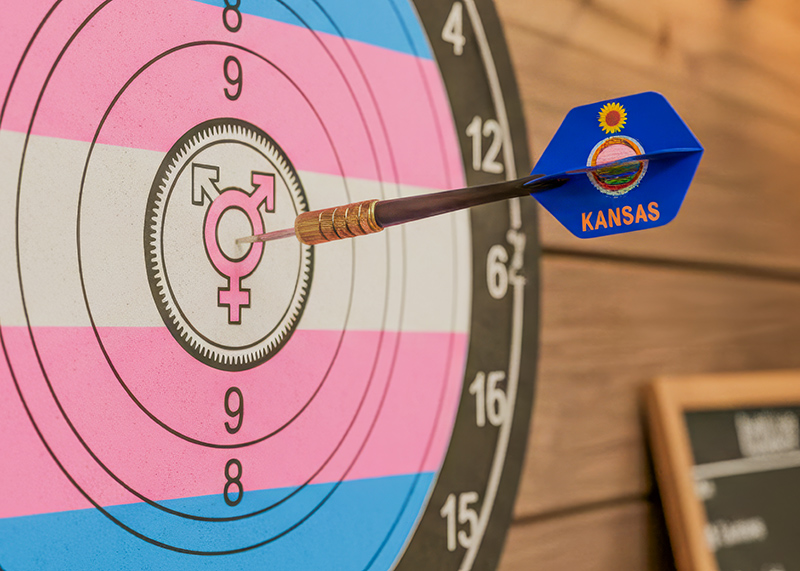Obergefell Is at Risk. LGBTQ Advocates Must Act Now.
With Obergefell at risk and 32 states poised to restrict same-sex marriage, LGBTQ advocates push to enshrine protections at the state level.

On June 22, 2022, the Supreme Court issued a landmark decision with Dobbs v. Jackson Women’s Health Organization. Abortion rights were now no longer guaranteed nationwide as the issue was left up to the states. This shock reversal of over 49 years of precedent left reproductive rights activists scrambling as anti-choice state laws stemming from as far back as 1864 were revived and reinstituted.
As people’s ability to access to reproductive care dwindled in conservative-led states, activists also found their footing. The 2024 election saw abortion rights ballot measures win in seven out of ten states. As we navigate a landscape where it will likely be a long time before we see any form of successful federal legislation protecting a woman’s right to choose, state-by-state activism seems to be the driving force behind change.
In his concurring opinion overturning Roe v. Wade, Justice Clarence Thomas issued a harrowing claim. He wrote that Justices should “reconsider all of this Court’s substantive due process precedents” including Lawrence and Obergefell. These decisions guarantee the rights for consenting adults to engage in same-sex sexual activity and for same-sex couples to marry one another, respectively.
This was, and still remains, a terrifying view for a sitting Supreme Court Justice to hold. At this critical time, the LGBTQ community can either sit by in idle horror or mobilize in preparation.
It is time for LGBTQ rights activists to be proactive instead of waiting until the potential shoe drops. Social conservatives are certainly making moves behind the scenes. This February, NBC News reported that lawmakers in at least nine states have proposed measures to undermine marriage equality. The seeds of destruction are being sown against marriage equality, and it is imperative that we recognize them, dismantle them, and plant our own seeds in protection of this important, hard-fought right.
Thankfully, we are already seeing some progress on this front.
In 2024, three states passed ballot measures protecting the right to marriage equality in their constitutions. Colorado recently guaranteed the right to marriage equality via their legislature. Even federally, a bipartisan push in 2022 saw the Respect For Marriage Act signed into law by President Biden, repealing the Defense of Marriage Act and requiring any potential states without marriage equality laws to recognize the marriages of same-sex couples legally married in other states.
However, the number of states with these laws protecting same-sex marriage is still far too small. If Obergefell were to be overturned, Axios reports that 32 states would immediately limit marriage equality through “trigger” laws. LGBTQ activists wishing not to backslide must pressure legislatures to rectify this and make this a salient issue for local politicians.
Beyond pressuring politicians, an even more effective tactic comes through direct democracy. The Movement Advancement Project reports that 19 states offer a direct citizen initiative process that could codify same-sex marriage into State constitutions. Thirteen of these are states that currently do not protect (or even outright ban) same-sex marriage.
These past few months, there has even been groundswell activism in one state to get this sort of measure on the ballot. Ohio Equal Rights has led the charge in the Buckeye State, proposing “The Ohio Equal Rights Amendment.” This amendment would not only enshrine same-sex marriage in the state constitution but also implement nondiscrimination policies to protect all LGBTQ residents.
However, even this ballot process in Ohio has faced roadbumps. In a 3-2 vote, along party lines, the Ohio Ballot Board ruled that the proposed amendment must actually be split into two amendments. This was, of course, decided after the group already submitted twice the number of required signatures to the Secretary of State. This will complicate the process, as the group will either have to challenge the ruling through the Ohio Supreme Court, or collect the required signatures for two now-separate amendments all over again.
For decades, abortion seemed like a white whale for social conservatives — an unreachable judicial mainstay that could merely be restricted, not outright overturned. And then Dobbs happened.
Obergefell has far less precedent compared to Roe in the United States and has a Thomas-shaped target on its back. The current Supreme Court is not afraid to reverse the rights of millions of LGBTQ individuals.
Activism, like the ballot initiative process we’re seeing from Ohio Equal Rights, represents an essential means of safeguarding civil rights. It’s important we continue to fight back and these sort of initiatives make a difference.
Maximilian Sandefer is a communications associate, freelance creative, and game show lover. He recently earned a master’s degree in Political Communication from American University.
Support Metro Weekly’s Journalism
These are challenging times for news organizations. And yet it’s crucial we stay active and provide vital resources and information to both our local readers and the world. So won’t you please take a moment and consider supporting Metro Weekly with a membership? For as little as $5 a month, you can help ensure Metro Weekly magazine and MetroWeekly.com remain free, viable resources as we provide the best, most diverse, culturally-resonant LGBTQ coverage in both the D.C. region and around the world. Memberships come with exclusive perks and discounts, your own personal digital delivery of each week’s magazine (and an archive), access to our Member's Lounge when it launches this fall, and exclusive members-only items like Metro Weekly Membership Mugs and Tote Bags! Check out all our membership levels here and please join us today!



























You must be logged in to post a comment.